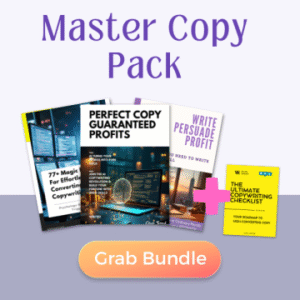Starting an email copywriting business offers incredible opportunities for creative professionals seeking freedom and income. The email copywriting business continues to thrive as companies recognize the power of well-crafted messages. Every day, businesses need compelling emails that connect with customers and drive sales. Your email copywriting business can solve this problem while creating a flexible career path. Many entrepreneurs begin their email copywriting business with minimal overhead costs. The demand for skilled email copywriters grows as digital marketing expands across industries. Let’s explore how you can build a successful email copywriting business from scratch.
Why email copywriting remains crucial for businesses
Email marketing delivers the highest ROI of all marketing channels. Companies earn $36 for each dollar spent on email marketing campaigns. Most consumers check their email multiple times throughout the day. Personalized email content creates stronger connections than general social media posts. Businesses own their email lists unlike borrowed audiences on social platforms. Effective email copy drives immediate sales without algorithm changes affecting reach. Companies require regular email content for nurturing leads and building loyalty. The demand for quality email copywriting increases as inbox competition grows. Consumers expect personalized and relevant messages from brands they follow. Your email copywriting business helps companies cut through noise and engage audiences effectively.
Recommended reading:
- Email ad copywriting: essential strategies
- Copywriting email: persuasive marketing
- Copywriting for ads to double your conversion
- Copywriting social media for each platfor
Setting up an email copywriting business
Starting your email copywriting business requires minimal initial investment. First, choose a business structure like sole proprietorship or LLC. Register your business name with local authorities and create professional accounts. Build a simple website showcasing your email copywriting services and results. Create dedicated business accounts for financial management and taxes. Establish clear service packages with defined deliverables and timelines. Develop templates for proposals, contracts, and client onboarding processes. Set aside workspace that allows focused writing without distractions. Invest in reliable technology including backup systems for client work. Create systems for tracking projects, deadlines, and client communications. Consider business insurance to protect against potential liability issues.
Skills needed to succeed as an email copywriter
Understanding consumer psychology drives successful email campaigns. Master the art of crafting compelling subject lines that boost open rates. Develop strong storytelling abilities that engage readers immediately. Learn to write conversational copy that feels personal yet professional. Study persuasive writing techniques that motivate readers to take action. Understand different email types from welcome sequences to abandoned cart reminders. Practice writing concisely while maintaining clarity and impact. Develop research skills to understand client industries and target audiences. Learn basic HTML formatting for email-friendly designs. Familiarize yourself with email marketing metrics and what they reveal. Cultivate editing skills to refine copy until every word serves a purpose.
Pricing models for email copywriting services
Pricing structures vary widely across the email copywriting business landscape. Project-based pricing works well for defined campaigns with clear parameters. Charging per email allows flexibility based on complexity and length. Monthly retainer models provide steady income for ongoing client relationships. Value-based pricing ties your fees to client results and ROI. Entry-level email copywriters typically charge between $50-150 per email. Experienced professionals command $200-500 for standard marketing emails. Complex email sequences or funnels justify premium rates starting at $1,000. Consider tiered pricing packages offering different service levels and deliverables. Increase rates gradually as you build experience and collect testimonials. Track your time initially to ensure pricing covers your actual work hours.
Finding and attracting clients
Identify ideal clients who recognize the value of professional email marketing. Create a portfolio showcasing diverse email copywriting examples and results. Leverage LinkedIn to connect with marketing directors and business owners. Join communities where potential clients discuss marketing challenges and needs. Offer free resources demonstrating your expertise in email marketing strategies. Consider specialized niches where your knowledge provides additional value. Partner with web designers and marketing agencies for referral opportunities. Use cold email outreach that demonstrates your copywriting skills firsthand. Attend industry conferences where businesses seek marketing solutions. Create case studies highlighting successful campaigns and concrete results. Implement testimonial collection systems after completing successful projects.
Tools and resources for email copywriters
Professional email copywriters rely on specialized tools for optimal results. Grammar checkers like Grammarly ensure error-free copy every time. Email testing platforms show how copy appears across different devices. Subject line analyzers help predict open rates before sending. Templates save time while maintaining consistent quality across projects. Swipe files collect successful email examples for inspiration. Email service provider knowledge helps you understand technical limitations. Project management tools keep client work organized and on schedule. Time-tracking software ensures profitable pricing and productive workdays. Continued education resources help master emerging email marketing trends. Join professional associations connecting copywriters with potential clients and partners.
Mastering email copywriting techniques
Write compelling subject lines that promise specific, relevant benefits. Craft personalized openings that immediately engage the reader. Focus each email on solving one specific problem or desire. Create scannable content with short paragraphs and bulleted lists. Include social proof showing others benefiting from your offers. Master the art of conversational writing that builds relationships. Write strong calls-to-action that clearly direct next steps. Understand email sequence logic building toward conversion goals. Balance promotional content with valuable information and insights. Adapt voice and tone for different audiences and purposes. Study psychology principles that drive higher response rates.
Structuring profitable client relationships
Establish clear boundaries regarding revisions and communication expectations. Create onboarding questionnaires extracting crucial strategic information upfront. Develop straightforward contracts protecting both parties’ interests. Set realistic timelines allowing for thoughtful creative development. Request necessary resources before starting any project. Present copy with explanatory notes justifying strategic decisions. Educate clients about email marketing best practices and limitations. Build systems for regular check-ins and campaign result reviews. Develop upsell opportunities for ongoing email marketing support. Offer complementary services expanding your value to clients. Create referral programs rewarding clients who recommend your services.
Email testing and optimization strategies
Learn basic A/B testing principles for continually improving results. Monitor open rates to refine subject line effectiveness. Track click-through rates revealing engaging content and offers. Analyze conversion rates connecting copy directly to business results. Study unsubscribe patterns identifying potential messaging problems. Segment audiences for more targeted and relevant messaging. Test different email lengths across various audience segments. Experiment with varied calls-to-action measuring response differences. Optimize send times based on audience engagement patterns. Refine your voice based on customer feedback and results. Implement progressive improvements rather than complete overhauls.
Case studies: Successful email copywriting campaigns
A software company increased trial signups by 34% through targeted sequences. An e-commerce client reduced cart abandonment by implementing personalized reminders. A coaching business generated $127,000 from a single launch sequence. A nonprofit organization doubled donation rates through emotional storytelling. A B2B service provider shortened sales cycles using educational emails. A membership site reduced churn by 28% with engagement campaigns. A local business drove foot traffic through location-based email marketing. An online course creator built anticipation through strategic pre-launch emails. A subscription box service recovered canceled subscriptions through winback campaigns. These results demonstrate effective email copywriting’s business impact across industries.
Overcoming common email copywriting challenges
Combat writer’s block by developing systematic research processes. Address declining open rates through subject line innovation. Overcome audience fatigue by introducing fresh perspectives regularly. Navigate promotional limitations with creative non-promotional content. Adapt to changing email client technologies affecting display options. Handle demanding clients through clear communication and boundaries. Manage tight deadlines without sacrificing quality or creativity. Prevent burnout by establishing sustainable work practices. Address price objections by clearly demonstrating ROI potential. Stay current with evolving spam filter algorithms and regulations. Balance creative expression with marketing strategy and client expectations.
Scaling your email copywriting business
Develop repeatable processes allowing consistent quality at higher volume. Consider hiring subcontractors for specialized or overflow work. Create training materials capturing your unique approach and standards. Build relationships with complementary service providers for referrals. Consider productizing aspects of your services for passive income. Develop email templates reducing production time while maintaining quality. Consider specialized niches commanding premium rates and less competition. Explore teaching opportunities sharing your expertise while building authority. Implement automated systems for client acquisition and management. Focus on recurring revenue models for business stability. Continually refine your services based on market demands.
The future of email copywriting
AI tools will assist but not replace human creativity and connection. Hyper-personalization will continue driving higher engagement rates. Interactive emails will create more engaging subscriber experiences. Privacy changes will emphasize first-party data and relationships. Increased competition will demand higher creativity and strategic thinking. Voice-optimized content may influence email copywriting approaches. Specialized expertise will command premium rates in competitive markets. Integration with other channels will create cohesive marketing experiences. Mobile optimization will remain crucial for effective communication. Sustainability messaging will gain importance across industries. Your email copywriting business must evolve alongside these emerging trends.
Conclusion
Building a successful email copywriting business requires dedication and strategic focus. Start by mastering fundamental copywriting skills that drive measurable results. Develop clear service offerings meeting specific client needs and challenges. Build systems supporting sustainable business growth without constant hustling. Position yourself as a strategic partner rather than just a service provider. Continuously improve your craft through deliberate practice and learning. Connect with fellow professionals for support and collaborative opportunities. Remember that effective email copywriting transforms business results across industries. Your expertise creates meaningful connections between brands and their audiences. Begin today by implementing one strategy from this comprehensive guide. Your email copywriting business success depends on taking consistent, focused action.

